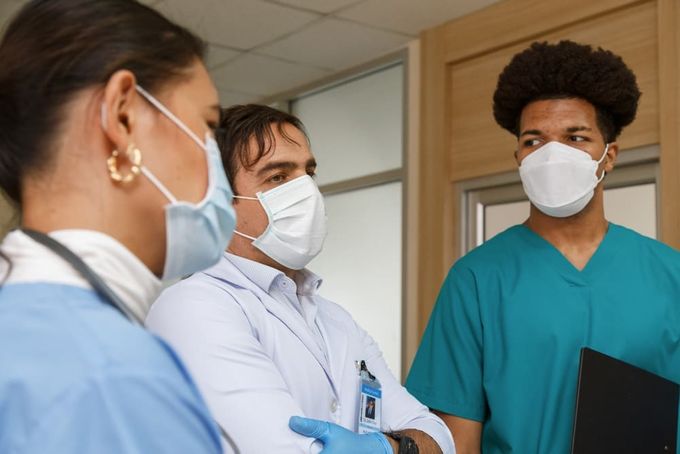
A Comprehensive Guide to Medical Residency
Recruiting top medical residents is crucial for a thriving healthcare organization. They bring fresh perspectives, specialized skills, and a valuable boost to patient care. But attracting the best talent requires a well-defined residency program.
Today's medical students have their pick of residency programs, and the demand for skilled professionals is constantly increasing.
Outdated structures, limited mentorship opportunities, and a lack of transparency can leave you overlooked. That's why we'll delve into the ins and outs of medical residency to attract top talent and secure the future of healthcare.
Meet the Expert
Mical DeBrow is an accomplished healthcare leader and clinician with extensive expertise spanning pharma, healthcare payers and providers, and healthcare information technology.

Access Clinical Resources: Unite your department's knowledge on any device.
Manage Your Knowledge: Easily create, maintain, and update clinical resources.
Integrate Your Workflows: Deliver content directly to the point-of-care.
Collaborate and Communicate: Share knowledge and communicate across medical institutions.
Analyze Your Data: Track clinician engagement with custom insights.
What Are Medical Residency Programs?
Medical residency programs enable newly graduated medical students to specialize in their field of choice. Their duration ranges from one to over five years, depending on the chosen specialization.
The training usually takes place at a hospital or an academic center, giving the residents much-needed hands-on experience. Through medical residency, trainees gain confidence when faced with real-world patient concerns. They become fully functional physicians who can treat patients without supervision.
» Discover innovative methods for training healthcare staff
How Organizations Choose Residents
Healthcare organizations follow the guidelines set by the Accreditation Council for Graduate Medical Education (ACGME). They also use a centralized system to match graduates with hospitals or academic centers. It's called the National Resident Matching Program (NRMP).
Here's a breakdown of how organizations choose residents through the NRMP:
1. Application
- Applicant Submission: Medical students apply to their preferred residency programs through the Electronic Residency Application Service (ERAS). They usually submit transcripts, recommendation letters, and a personal statement.
- Program Selection: Residency programs set their criteria and select applicants for interviews.
2. Matching Algorithm
- Rank Lists: Applicants and programs submit rank-order lists. Applicants choose their preferred programs and vice versa.
- Matching Process: The NRMP uses an algorithm to create matches that consider both preferences as much as possible. The goal is to optimize the number of students matching their desired specialties and programs.
Due to the demanding nature of the work and the prestigious nature of becoming a doctor, residency programs receive many applications for a limited number of positions.
» Check out tips on training healthcare employees
What Do Residency Programs Look For?
- Academic Performance: Medical school transcripts and USMLE (United States Medical Licensing Examination) scores are crucial factors.
- Letters of Recommendation: Strong recommendations from school faculty can significantly boost an application
- Personal Statement: This allows applicants to showcase their motivations, career goals, and fit for the program.
- Research Experience: Research involvement demonstrates a commitment to the field and a solid academic foundation.
- Extracurricular Activities: Leadership roles, community service, and activities relevant to the specialty can strengthen applications.
- Interview Performance: Interviews enable programs to assess interpersonal skills, communication, and overall fit.
» Check out the roles and challenges of healthcare managers
The Effects of Medical Residency on Healthcare
With honed skills and specialized knowledge, residents contribute meaningfully to patient care while still under supervision, ultimately leading to better patient outcomes.
Suppose a resident is about to inject 50 milliequivalents of potassium directly into a patient's IV. It could be fatal. But, a mentor's timely intervention and teaching on safe administration can prevent this mistake from repeating.
Is New Technology Affecting Residency Programs?
The latest advancements in medical technology have improved how residency programs operate. Electronic health records help clinicians access information efficiently, while AI can suggest. necessary actions. But remember, these innovations should augment clinicians' work, not replace them.
For example, C8 Health can be a central hub for a hospital's best practices. Residents can use it to find the necessary information, saving valuable time spent sifting through paper charts or outdated documents.
Read our latest case study to see how implementing C8 Health has impacted healthcare workers across the US.
Ensuring Quality Supervision and Teaching for Residents
While some physicians are naturally inclined towards mentorship and possess the necessary skill set to guide and teach their residents, others may need help.
It can affect the quality of medical education trainees receive, impacting patient care. To ensure effective teaching and learning, maintain a reasonable ratio of residents assigned to each supervising physician to avoid burnout.
Beyond long hours, residents face heavy workloads, challenging patients, and a demanding learning environment. These can lead to burnout and, potentially, medical errors. You can address this by supporting trainees with counseling services, mental health professionals, and wellness programs.
» Have newly hired medical residents? Refine their onboarding
Medical Residency: A Roadmap to a Promising Future
Humility and a lifelong learning mindset are crucial for medical residents. Programs require dedication and extensive supervision, which trainees need to understand.
Healthcare organizations should also recognize their investment in students by prioritizing their well-being. By fostering a supportive environment that balances learning with self-care, residency programs can empower residents to flourish and ultimately deliver exceptional care.


